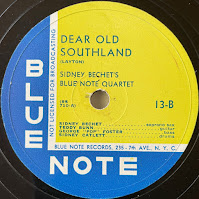Sidney Bechet Blue Note Quartet - March 27 1940
BLP 1201 Liner Notes
The 1940s saw the gradual return of Sidney Bechet to the limelight. There were frequent concerts at Town Hall, Blue Note record dates, appearances at such clubs as Nick's in Greenwich Village. Not long after the end of World War II Bechet heard Europe beckoning again. In recent years he has spent most of his time in France and has visited the U.S. only occasionally.
Max Harrison - The Complete Blue Note Recordings of Sidney Bechet - Mosaic Records MR6-110
[This was] the first Blue Note session under Bechet's name, whose pianoless instrumentation anticipates the earliest Bechet-[Mugsy] Spanier items done for the Hot Record Society a day later. Therefor the guitar's prominence continues on LONESOME BLUES. [Teddy] Bunn again murmurs privately, melodiously, while his leader plays a supporting part that deserves attention. Bechet's clarinet solos are poignantly blue yet also elegant. The force of his soprano saxophone has led to this latter quality being ignored in his work. Elegance was evident on his first recordings, however, and, considering what most saxophone playing (including Coleman Hawkins') was like in the early 1920s, was there a particularly significant amount of mastery.
Max Margulis - 1940 Blue Note Brochure
"Lonesome Blues," which Louis Armstrong made famous in the middle twenties, becomes the vehicle for a mounting, intensely dramatic clarinet solo: Bechet's soprano saxophone is featured in the completely new version of "Dear Old Southland" (Blue Note No. 13). "Bechet's Steady Rider" represents a fresh departure in rapid, rhythmic expression, and in "Saturday Night Blues," Bechet's charged but restrained molodic line reaches an unprecedented artistic summit (Blue Note No. 502)
DEAR OLD SOUTHLAND was a piece that Sonny Greer recalled Bechet playing when he was a member of Ellington’s Washingtonians in 1923. In this 1940 performance the variations have a certain formality, yet the playing itself is spontaneous. In fact, Bechet could nearly always renew himself on old material, and any feeling of deliberateness is dispelled when the tempo doubles. Two themes of his own follow, one fast, one slow.
Bunn is in vigorous mood on Bechet’s STEADY RIDER and the clarinet playing afterwards fuses melodic flow and strong swing.
SATURDAY NIGHT BLUES is more introverted, if such a term can be appli9ed to this compulsive communicator. In the quiet clarinet asides at the close we detect as great a certainty of expressive purpose as when Bechet is riding high with his soprano saxophone.
BLP 1201 Liner Notes
Sidney recorded Dear Old Southland, a tune also known in its Negro spiritual form as Deep River and introduced to jazz fans as a Louis Armstrong trumpet solo in 1930. Alfred Lion and Bechet anticipated the vogue for pianoless combos on this date, for the accompaniment simply comprises guitar, bass and drums.
The American Record Guide – June 1940 – Issue 6 Volume 2
Lonesome Blues (Armstrong); and Dear Old Southland (Layton). Blue Note disc No. 13, price $1.50.
Saturday Night Blues; and Bechet’s Steady Rider; 10-inch disc No. 502. price $1.00). Both played by Sidney Bechet's Blue Note Quartet (Sidney Bechet, clarinet and soprano sax; Teddy Bunn, guitar; Pops Foster, bass; Sidney Catlett, drums).
Can you imagine Louis Armstrong on clarinet and soprano sax? Well, this twelve inch record is Just that. There is the same intensity of feeling, the same virtuosity, almost the same phrases. one imagines. It is a remarkable performance. beautifully supported by the other members of the quartet.
Saturday Night Blues is a real, slow blues in which Bechet displays some moving low clarinet work backed by soft rolling on the drums. Bunn, too, contributes a beautifully poised solo. Catlett's rim shots are, however, a trifle loud and not in keeping with the low key. Bechet’s Steady Rider is fast ensemble work with Bechet leading. Bechet's scream notes raise the hair on the nape of your neck. They must be heard to be believed. Everyone gets a chance to do his best and he does it. Foster and Catlett deserve a big hand for this record.
Down Beat 15 May 1940 – Volume 7 Issue 10
Catlett Pounds Rhythm
Blue Note teams Bechet with Teddy Bunn. guitar; Pop Foster, bass, and Sid Catlett, drums. for
Lonesome Blues and Dear Old Southland (12-inch – No. 13) and Saturday Night Blues and Bechet’s Steady Blues (10-inch, 502). Sidney plays sax only on Southland. Again, as with the HRS output he displays talent which years before placed him among the "immortals” of jazz. Bunn's guitar solos alternately with Bechet and proves far more interesting than Mastren’s anemic pluckings Again, the recording is good. Big Sid’s drumming has everything the Bechet-Spanier experiment lacks.
The American Record Guide May 1940 Volume 6 Issue 1
Blue Note has made new recordings with Sidney Bechet. The Sidney Bechet Blue Note Quartet, heard on previous releases. plays Lonesome Blues and Dear Old Southland on No.502. Simultaneously. Teddy Bunn's first solo records were issued: King Porter Stomp and Bachelor Blues (No. 503) and Guitar in High and Blues Without Words (No. 504). All of these records be commented upon as soon as they are received.
 |
| Down Beat 1941 |
Down Beat 15 April 1940: Volume 7 Issue 8
Blue Note recorded Sidney Bechet on four tunes last week. With him were Sid Catlett. Teddy Bunn
and Pop Foster. Tunes cut were Lonesome Blues, Dear Old Southland, Bechet’s Steady Rider and
Saturday's Children.
Reeves Sound Studios, NYC, March 27, 1940
Sidney Bechet, soprano sax; Teddy Bunn, guitar; George "Pops" Foster, bass; Sidney Catlett, drums.










No comments:
Post a Comment